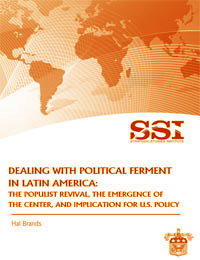Dealing with Political Ferment in Latin America: The Populist Revival, the Emergence of the Center, and Implications for U.S. Policy

Authored by Dr. Hal Brands.
September 2009
85 Pages
Brief Synopsis
The current political dynamics in Latin America is analyzed, and their meaning for the United States is evaluated. The author argues that references to a uniform “left turn” in the region are misleading, and that Latin America is actually witnessing a dynamic competition between two very different forms of governance. Represented by leaders like Hugo Chávez, Evo Morales, and others, radical populism emphasizes the politics of grievance and a penchant for extreme solutions. Moderate, centrist governance can be found in countries like Chile, Brazil, Mexico, Colombia, and Uruguay. It stresses diplomatic pragmatism, the protection of democratic practices, and the need to blend macroeconomic responsibility with a social conscience. To the extent that the United States can strengthen the centrists while limiting the damage caused by radical populism, the author argues it can promote integral growth, democratic stability, and effective security cooperation in Latin America. A clear understanding of the trends discussed is essential to devising appropriate U.S. policies toward that region.
Summary
Over the past decade, Latin America has experienced considerable political upheaval. Persistent poverty, corruption, and public insecurity have produced profound popular dissatisfaction and caused widespread ideological ferment. While the electoral results of this ferment are frequently described as a “lurch to the left,” such descriptions are misleading. Latin America is not experiencing a uniform shift to the left; it is witnessing a competition between two very different political trends.
The first trend is radical populism. Leaders like Hugo Chávez, Evo Morales, Rafael Correa, and others angrily condemn the shortcomings of capitalism and democracy, and frame politics as a struggle between the “people” and the “oligarchy.” They promote prolific social spending, centralize power in the presidency, and lash out at Washington. This program is, in some ways, strategically problematic for the United States. Populist policies ultimately lead to authoritarianism, polarization, and economic collapse, and certain populist leaders have openly challenged U.S. influence and interests in Latin America.
Yet it would be a mistake to overestimate the dangers posed by radical populism. There are limits to the more threatening aspects of populist diplomacy, and, despite their anti-American rhetoric, populist leaders in Ecuador, Nicaragua, and Argentina have continued to cooperate with Washington on a number of issues. More importantly, taking too dire a view of the current situation risks ignoring the effects of the second essential trend in Latin American politics: the rise of the center.
On both center-left and center-right, leaders in countries like Chile, Brazil, Uruguay, Mexico, and Colombia have responded to the present crisis in Latin America by emphasizing moderation rather than radicalism. They mix market-oriented economic policies with creative social reforms, protect democratic practices, and confront the long-standing shortcomings of the Latin American state. They pursue pragmatic foreign policies, stressing cooperation rather than confrontation with the United States.
While the political climate in Latin America presents challenges for the United States, it also offers opportunities. Going forward, U.S. interests will best be served by a strategy that: (1) limits the fallout caused by populist diplomacy; (2) empowers moderate leaders; and (3) supports a longer-lasting campaign to address social and economic conditions conducive to political radicalism.
Access Full Report [PDF]: Dealing with Political Ferment in Latin America: The Populist Revival, the Emergence of the Center, and Implications for U.S. Policy
|
NEWSLETTER
|
| Join the GlobalSecurity.org mailing list |
|
|
|

